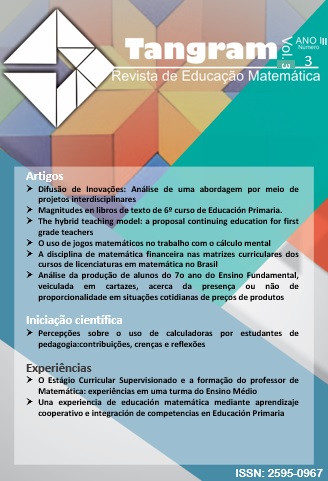Analysis of the production of 7th grade students, in posters, about the presence or absence of proportionality in everyday product price situations
DOI:
https://doi.org/10.30612/tangram.v3i3.10869Keywords:
Proportional Quantities. Proportionality. Mathematics Education.Abstract
The general objective of the work is inserted in the concerns of a large study that aims to answer pertinent questions to the knowledge for teaching teachers in service. Resides in presenting and analyzing the data present in productions presented by students of the 7th grade of elementary school, through posters posted on the walls of a public school classroom. It was considered a qualitative research, strategic action research modality, according to Franco (2005), in which the analysis of the data, collected at random, constituted the motto to indicate indications about how the proposition of activities and the Not correcting the respective results can affect distortions regarding the inappropriate appropriation of knowledge of the proportionality,content by the students. The results revealed evidence that the content was not adequately developed to effectively understand the concept of proportionality -involved in problem situations.Downloads
References
Fischbein, Efrain. (1994). The interaction between the formal, the algorithmic and the intuitive components in a mathematical activity. In: Didactics of Mathematics as a Scientific Discipline. Mathematics Education Library. Dordrecht: Kluwer Academic Publishers.
Franco, Maria Amélia Santoro (2005). Pedagogia da Pesquisa-ação. Revista Educação e Pesquisa. V.31.n.3. set/dez. 483-502. São Paulo. SP.
Disponível em: http:// www.sciwlo.br/pdf/ep/v31/n3/a11v31n3.pdf. Acesso em 19 dez. 2019.
Freire, Paulo (1996). Pedagogia da autonomia: saberes necessários à prática educativa. Coleção Leitura. São Paulo: Paz e Terra.
Hargreaves, Andy (1998) Os professores em tempos de mudança: o trabalho e a cultura dos professores na Idade Pós-Moderna. Lisboa: Editora Mc Graw-Hill.
Lima, Elon Lages (1991). Grandezas Proporcionais. In: Meu Professor de Matemática e outras histórias. Rio de Janeiro. RJ: IMPA Instituto de Matemática Pura e Aplicada. VITAE Apoio à cultura, Educação e Promoção Social.
Teixeira, Paulo Jorge Magalhães (2012)Um estudo sobre os conhecimentos necessários ao professor de Matemática para a exploração de problemas de contagem no Ensino Fundamental. (Tese) Doutorado em Educação Matemática, Universidade Bandeirante de São Paulo.
Shulman, Lee S. (1986). Those who understand: knowledge growth in teaching. Educational Researcher. v.15, n.2, p.4-14.
Tall, David; Vinner, Shlomo. (1981). Concept image and concept definition in mathematics with particular reference to limits and continuity. Educational Studies in Mathematics, 12, 151-169.
Skovsmose, Ole (2000). Cenários para investigação. Boletim de Educação Matemática. Rio Claro: UNESP.
Cobb, Paul; Confrey, Jere; diSessa, Andrea; Lehrer, Richard; Schauble, Leona (2003). Design Experiments in Educational Research. American Educational Research Association. vol. 32. No. 1. pp. 9-13. jan/fev.
Fishbein, Efrain. (1975). The intuitive sources of probabilistic thinking in children. Dordrecht: Reidel.
Downloads
Published
How to Cite
Issue
Section
License
Authors must accept the publication rules when submitting the journal, as well as agree to the following terms:
(a) The Editorial Board reserves the right to make changes to the Portuguese language in the originals to maintain the cultured standard of the language, while respecting the style of the authors.
(b) Authors retain the copyright and grant the journal the right to first publication, with the work simultaneously licensed under the Attribution-NonCommercial-ShareAlike 3.0 Brazil (CC BY-NC-SA 3.0 BR) that allows: Share - copy and redistribute the material in any medium or format and Adapt - remix, transform, and create from the material. CC BY-NC-SA 3.0 BR considers the following terms:
- Attribution - You must give the appropriate credit, provide a link to the license and indicate whether changes have been made. You must do so under any reasonable circumstances, but in no way that would suggest that the licensor supports you or your use.
- NonCommercial - You may not use the material for commercial purposes.
- Sharing - If you remix, transform, or create from material, you must distribute your contributions under the same license as the original.
- No additional restrictions - You may not apply legal terms or technological measures that legally restrict others from doing anything that the license permits.
(c) After publication, authors are allowed and encouraged to publish and distribute their work online - in institutional repositories, personal page, social network or other scientific dissemination sites, as long as the publication is not for commercial purposes.






